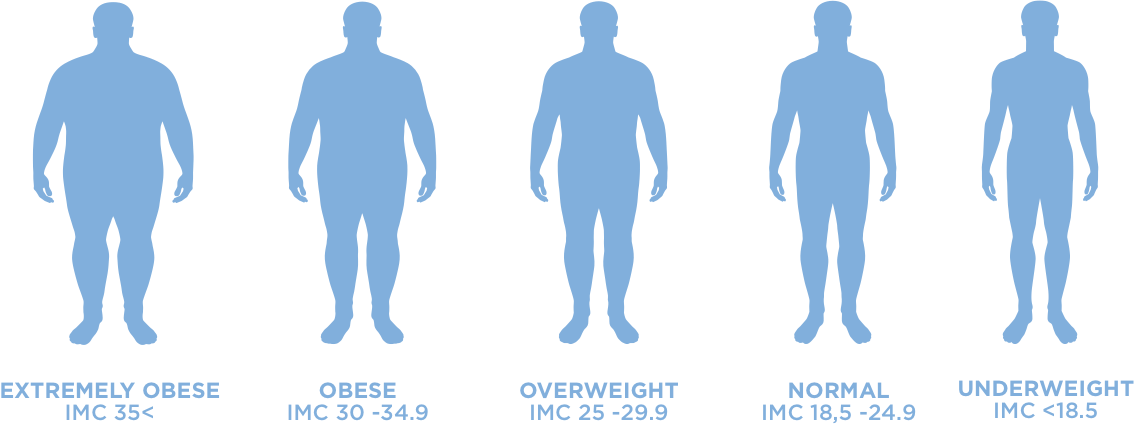Do you have any queries about your health? Here are a series of common questions our patients ask.
AM I SUFFERING FROM OBESITY?
Obesity is not an aesthetic issue, it is a health issue. Many patients are aware that they are overweight, even though they feel healthy. They do not show any health problems initially, but there is no such thing as healthy obesity and each person’s prognosis will be determined by how their disease develops.
As experts in the overall management of obesity, we recommend an operation for obesity in all patients with a BMI greater than 30 in selected cases, since surgery is the most effective treatment for those patients.
Morbid obesity occurs when you have a BMI of 40 kg/m² or higher, usually after years of severe obesity, and it is a disease caused by a combination of a very high-calorie diet and a sedentary lifestyle, though in some cases it tends to be of hereditary origin. Improving your diet and taking exercise help you to lose weight, but morbid obesity is only solved by an operation. At Quirobes we want to offer you the best treatment by laparoscopy for your weight loss, and above all for your safety. In addition, we offer an overall work programme to prevent relapses in the future.
WHAT TYPES OF OBESITY ARE THERE?
Obesity is classified into different types depending on your BMI.
See BMI calculator
WHAT PROBLEMS DOES OBESITY CAUSE FOR MY HEALTH?
When fat accumulates in your body you may suffer inflammatory processes which damage the arteries, pancreas and liver and cause diabetes and severe respiratory disorders. Fat can also accumulate in the blood vessels, causing arteriosclerosis and high blood pressure, hormonal dysfunctions, severe mobility problems and emotional and psychological problems in general.
HOW CAN THE RISK OF SUFFERING FROM OBESITY BE REDUCED?
At Quirobes, we fight obesity on various fronts, not just clinical, but also nutritional and psychological, and even by promoting healthy lifestyles and a good diet. Multidisciplinary management is key to the treatment of weight loss.
HOW SHOULD I PREPARE FOR OBESITY SURGERY?
The best advice is to put yourself in the hands of a specialist to guide you through the process of weight loss. It is also advisable to follow a preparatory diet and take exercise to improve your cardiopulmonary fitness level and to undergo a pre-anaesthetic examination. At Quirobes we will help you to follow the best diet and prepare for the operation, which should be short, painless and safe.
In traditional “open” surgery the surgeon makes a single incision, normally called a laparotomy, to enter the abdomen, giving rise to a high level of pain, infection and hernia of the abdominal wall. Laparoscopic surgery uses several incisions of between 0.5 and 1 cm. The instruments that enable the surgeon to work and perform operations are passed through these incisions. We treat all obesity patients by laparoscopy, even if they have had previous operations. In addition, we also use 3D technology in our centre to enhance the view obtained with the camera during the operation. So the surgical team can see all the key elements for the success of the operation with greater precision.
Compared with traditional open surgery patients have less pain, a shorter recovery period and less scarring with laparoscopic surgery.
Obviously a surgical operation using laparoscopy requires highly qualified and experienced staff and must be performed in a centre with all the requisite guarantees.
HOW LONG WILL IT TAKE FOR ME TO RETURN TO EVERYDAY LIFE?
Resuming a normal life may take from two to four weeks, although from a week after the operation the patient can lead a normal life taking care with making strenuous efforts.
OBESITY SURGERY FOR ADOLESCENTS
We also have experience with teenagers with a clear tendency towards obesity, usually with obese parents who are undergoing treatment. They must get involved in their parents’ treatment so as to raise their awareness to prevent a future problem. Naturally each age group needs special consideration and instructions. In the case of surgery for an adolescent, it is very important that they should undergo preparation involving specialised psychologists, because of the possible impact and influence on the teenager’s behaviour. It should be pointed out that surgery is only performed on adolescents as a last resort, after trying medical and psychological treatments under expert guidance.
OBESITY SURGERY OVER THE AGE OF 65
Some centres nowadays set the age limit for indicating surgery at between 60 and 65 years. However, many experts can manage patients with a long life expectancy who need to be operated on for lack of mobility and to be able to undergo other kinds of treatment such as orthopaedic surgery. At Quirobes we have successfully treated older patients in the best possible way to prevent any cardiopulmonary problems.
WHAT DO I NEED TO KNOW ABOUT THE THYROID?
It is a gland located at the level of the windpipe and its main function is to produce hormones that play a part in regulating many metabolic processes. It is vital to enable the body to function properly, but it is also problematic. It may work too little and poorly, or excessively, and it can also become inflamed and even produce tumours, endocrine cancer being the most common.
WILL THYROID SURGERY AFFECT MY VOICE?
Thyroid surgery is a complex type of surgery, and we therefore offer patients the possibility of neuromonitoring of the two nerves that serve to move the vocal chords and speak properly. Injury to these nerves is a serious and sometimes irreversible complication. Using intraoperative neuromonitoring can avoid them being injured and makes it possible to ensure that they are functioning properly. Moreover, we operate using high-precision magnifiers to minimise trauma to tissues and obtain good visualisation of the nerves, blood vessels and parathyroid glands. This technology enables us to guarantee excellent results for patients who need thyroid surgery.


